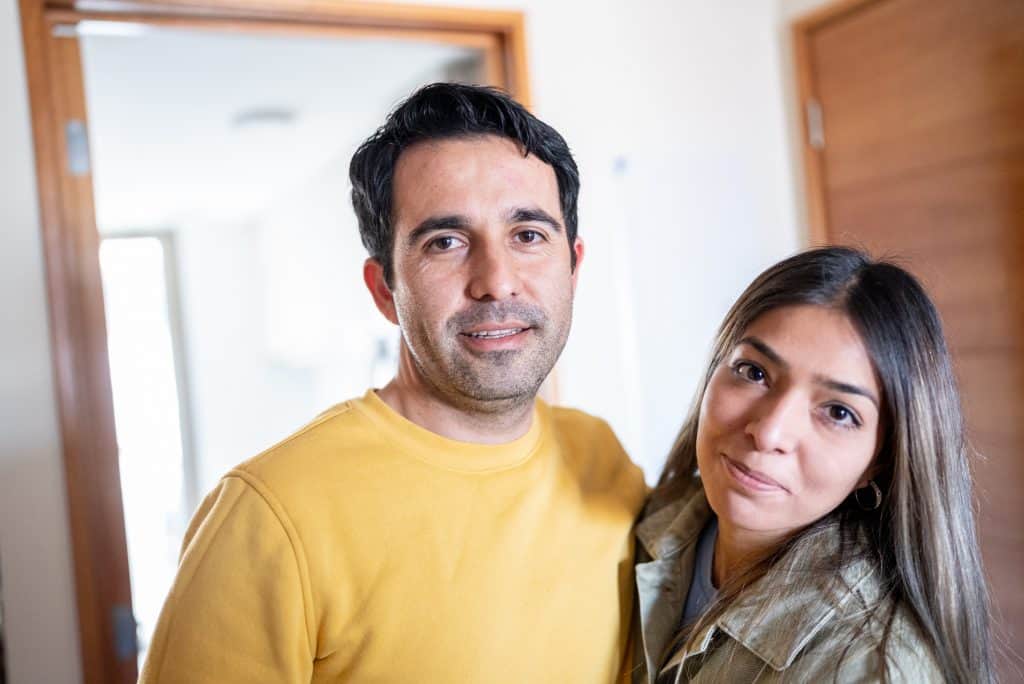Everyone needs a home base where he or she feels safe from the outside world. Ideally, our home with our family should be such a place. Unfortunately, when compulsive sexual behavior is present in the home, it ceases to feel like a safe place. The wounded spouse no longer feels comfortable to proceed through life normally. Everyday tasks can feel overwhelming.
The discovery of sexual betrayal can cause such trauma that everything that once felt safe is now called into question. This can leave the betrayed party doubting his or her own reality and ability to accurately discern who and what is safe.
While this may or may not involve physical safety, it most definitely affects feelings of spiritual, emotional, and mental safety. Lies, dishonesty, and deception are such a part of an addict’s life, it is difficult to find an aspect of the marital home and relationship not adversely impacted. The Roman poet Horace said, “Your own safety is at stake when your neighbor’s wall is ablaze.”
How does the wounded spouse reestablish safety? Whether during an unprecedented time of quarantine as we’ve been experiencing or during normal daily life, there are ways a betrayed spouse can attempt to restore feelings of safety in the home.
1. Speak up.
“You covet and cannot obtain, so you fight and quarrel. You do not have, because you do not ask. You ask and do not receive, because you ask wrongly” (James 4:2-3).
Too often we expect others to read our minds, so we fail to speak up for what we need. In the book of James, we see sound principles for asking for what we need in all areas of our lives. The word “covet” means to yearn for or possess.
How many times has your desperate need for safety caused conflict with your spouse? Have you clearly expressed how he or she might meet that desire? What do you think would help you to feel a sense of safety and security in your present circumstances?
These questions can help you identify areas to address:
- Do you need some physical space?
- Do you need your spouse out of the bedroom temporarily?
- What about physical touch? Do you need a break from that or do you need more?
- If there has been pornography viewed in your home, are there blocks or accountability programs you’d like to have on devices? Covenant Eyes provides great accountability.
- Would you feel more comfortable if your spouse gave you passwords and access to all of his or her devices and accounts?
- Are there cell numbers, social media contacts, or accounts you’d like to see deleted?
- What recovery steps would you like to see taken to help you believe he or she is serious about breaking free from past destructive behaviors?
- Would you like to have regular check-ins on his or her progress?
- If you want emotional connection, what would foster that for you?
When creating your list, consider your motive for each item. The purpose is to help restore a sense of safety and peace, not to punish or control your spouse. When presenting your list to your spouse, avoid doing so when either of you are rushed or when there is already an issue of conflict. Proceed with humility and grace. “Let your speech always be gracious, seasoned with salt, so that you may know how you ought to answer each person” (Colossians 4:6).
You have been wounded, and it is understandable that you might be tempted to present the items on your list as demands. It is important to remember that you cannot make another person do what you want them to do. However, you can ask for what you think you need and you can state clearly which, if any of those items, are absolutely critical for you to remain in the relationship. You should also have a plan in place in case your spouse refuses to provide what you need or agrees but does not follow through.
2. Practice good self-care.
Take time for yourself. Care for your physical body. What helps you feel refreshed and recharged? Certainly, plenty of sleep is essential. Eating healthy, well-balanced meals is important. Regular physical activity refuels the body and promotes the release of feel-good brain chemicals that help to relieve stress and lift your mood.
There was a time when King David was experiencing great trauma. While he and his men were away in battle, an enemy came in and burned their town and took their wives and children captive. When David and his men returned home, the men were enraged by what had happened. “David was greatly distressed because the men were talking of stoning him; each one was bitter in spirit because of his sons and daughters. But David found strength in the Lord his God” (1 Samuel 30:6).
As King David did, nourish your spirit. Unplug from social media and entertainment devices. Set aside time for prayer and meditation. Read scripture. Journal.
Do things to foster your emotional well-being, also. Set aside time to consider and process your feelings and emotions. Connect with others. Call a friend.
3. Recognize the ultimate source of your security.
“You are my hiding place; you will protect me from trouble and surround me with songs of deliverance” (Psalm 32:7).
Many of us enter marriage with the unrealistic expectation that our spouse will meet all of our spiritual, physical, mental, and emotional needs. Even in the healthiest of marriages, this is simply not possible nor is it God’s design.
The only one who is capable of meeting all of your needs is God. He is not only able, but he is also willing. “And my God will meet all your needs according to the riches of his glory in Christ Jesus” (Philippians 4:19). When we look to others to do for us what only God can do, we become like a beggar, holding out an empty cup to passersby.
It may be difficult to believe anything good can come from discovering you are married to someone who struggles with a porn or sex addiction. One of the greatest blessings that can come from betrayal trauma is the realization that we have expected others to provide for us that which only God can provide, and consequently we begin looking to him to meet our needs. Certainly, there are times when he uses others to do that in our lives, but he is the ultimate source.
If your life has been turned upside down due to the presence of porn or sex addiction in your spouse, it is completely understandable and normal to try to stabilize the situation and reestablish a sense of safety in your home. Ask for what you think you need from your spouse to accomplish that. Healthy self-care is especially important during this time. Make it a priority.
While it can certainly be helpful to your healing to have a spouse who is willing to accommodate your list of desires, you will likely soon recognize that situations will continue to arise than can threaten your feelings of safety because there are no guarantees your spouse won’t betray you again. It is possible to achieve a sense of safety regardless of your spouse’s choices.
Our sense of security should not depend upon the faithfulness of our spouse, but on the faithfulness of our God. Ask God to provide that peace for you. Only then will you cease to be at the mercy of others’ choices. Only then will you feel the safety to freely go about your life and thrive.








Do any men with sexual addiction ever really turn from it totally? I’m so weary of the deception and the anger when I see the old behavior again and again. I have hope on some days but on most days I feel trapped. There’s some good still in the marriage …. After 45 years of marriage, do I throw away the good to be free of the deception and anger? A very difficult decision. I do think I have PTSD from the repeated betrayal and have gone to Christian counseling for years. When I release it to the Lord, I have freedom until I allow it to drag me down again.
Unfortunately it is not so simple, not even psychologists can help us understand what we feel about sharing our husband with pornography women, it is difficult to look at someone who lies to us on the first good morning of the morning when minutes before you woke up he masturbated trapped in lust at the sight of women you could never be. And sex is so boring we feel that he just wants to escape this obligation, you really understand that he would give everything to not be there, and how to have a husband but not have a man, bad sex, discouraged, lack of erection, ejaculation retarded, tiring, we feel like crap. I can never in my life describe the extent of the pain, the humiliation of marrying someone with pornography habits, and it’s just the worst thing in the world, and I don’t believe that God wants to teach us anything with this endless suffering. It is just wrong to think that a woman has no sexual desires that this is so unnecessary that we can get better from the trauma by reading the Bible and praying, because we don’t need sex! So we can wait patiently in the Lord for the day that our Husband gets rid of it, look, we must express our feelings, we have the right, he has to be hurt because his sin hurts us much more. We need help we are suffering, praying and seeking God is very good, but the problem remains there … so what to do to feel good as a woman again?
Hi Mari,
I think you might appreciate this article: A High View of Marriage Includes Divorce. For too long, religion has required women to suffer when God does not. It is time for us to recognize that when a marriage is broken, it is broken, and the people within that marriage are free to make other choices. There is no reason to stay and be abused by the sin of your partner. Any Christian knows that the scripture says we are no longer slaves to sin, and that includes the sin of a spouse.
Peace to you,
Kay
Mari,
You are experiencing betrayal trauma. You asked what to do to feel good as a woman again. Get help for your trauma. I’ve been in counseling for 9 months for PTSD from my husband’s sex addiction. You can also find free courses online and podcasts to help you heal from betrayal trauma. You’re correct- we do have the right to express our feelings and show our hurt. I hope someone hasn’t told you differently. You’re also correct that women deserve a satisfying and mutually caring sexual relationship with our husbands.
Kay,
Thank you for sharing this. As I have been talking with other betrayed spouses, I find that many stay in a marriage with a man who has no intention of getting help for his addiction because they’re told that God hates divorce.
I agree as well. Accountability and consequences for actions.
Terribly written and it slightly gives a tone of blame on the innocent partner who is reacting and has no way of knowing or understanding how to proceed and what’s she’s up against. When you put the responsibility back on the innocent partner, it doesn’t hold accountable the partner who did the wounding. This was poorly written in my opinion. Having a good intention doesn’t always mean the end results are the same.
Many wounded partners have been lifelong victims of some sort of abusive behavior. I agree with Maria on the article tone. While it’s important that we ask for what we need, it’s far more complicated than that. My experience has been these requests result in rage against the wounded spouse. It’s important to have a strong support system and a safety plan if making requests leads to an escalation in an already unsafe environment.
Thank you Diana. Yes, these articles often assume that the spouse is a good, healthy person who just needs a little nudge to stop doing this one thing. Often, though, as you say, the spouse has a long history of abusive behaviors in addition to the pornography addiction.
WOMEN ARE NEVER, NEVER REQUIRED TO REMAIN WITH AN ABUSER.
If there is abuse of any kind: verbal, emotional, physical, sexual, financial–the list goes on–the marriage covenant has been broken and the wife is free to go.
A High View of Marriage Includes Divorce is an article we often share here that’s helpful.
Thanks for speaking up,
Kay
I completely agree with Maria.